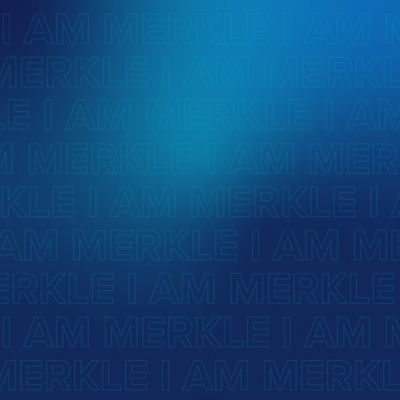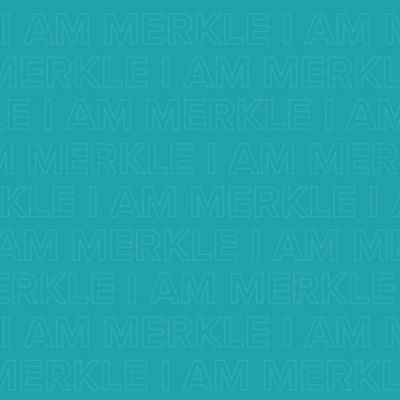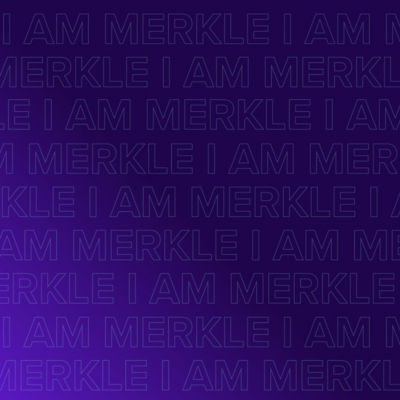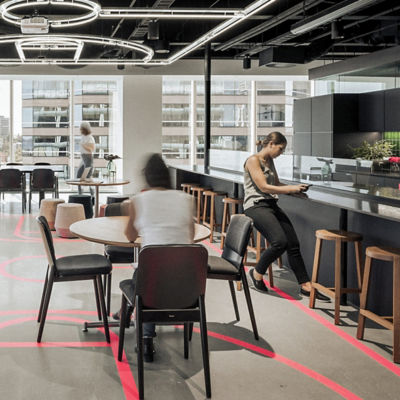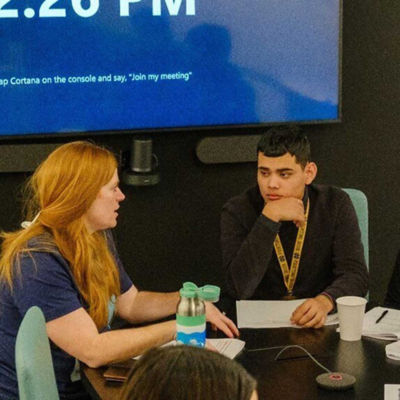National Coming Out Day is Sunday October 11. This Year, we asked members of our Diversity, Equity, & Inclusion team questions about the LGBTQ+ community and what the biggest challenges are. Learn more from Merkle's Client Partner, Tom MacKendrick, and Director of Collaboration Platforms, Christian Tillett:
1. Tell us about yourself; where did you grow up? Where do you live now? What do you like about your current town or city?
Tom: I grew up in a small rural community outside of the suburbs in southern Ohio. It was, for the most part, a pretty cool place to grow up as a kid. There was lots of outdoor space, and kids my own age to run around the woods and neighboring farms. I have a fraternal twin and we got into a lot of harmless trouble as kids. That changed once I hit puberty – and suddenly my mannerisms and “outgoing” personality drew the attention of the bullies.
Small town America, for all its closeness and neighborliness, is NOT a great place for anyone different, especially in 1976 when I hit high school. I didn’t know what gay was at that time…just that I was different. I did the gay trifecta in high school: band, drama, and chorus. I was also the captain of the swim team, diving team, and water polo team… but that’s because I spent my youth at the county pool where my mother could drop off the wild twins for several hours a day!
While I wouldn’t say I totally hid who I was, I was careful not to let people get too close. Once I figured out I was gay (we called it homosexuality back in the day – do I sound old?) I realized I needed to get out of that small town and expand my horizons. Go somewhere where they didn’t know me, where I could be myself.
When I went to college things changed for me. I came out at 17 to some close friends and discovered two things. There were others like me, and there were as many bullies and homophobic people in college as there were in my small town. But I had found my courage and had to be who I was– once you come out, you can’t go back in.
I finally ended up in West Hollywood, CA; the center of Boys Town in LA. I met my husband here. I’ve been here for 25 years and love it. I can be whoever and whatever I am and be my authentic self and live my truth. My husband and I throw a big gay Halloween party every year for about 100-150 of our closest friends (well we know most of them) before everyone heads down to the West Hollywood Halloween Festival that is about a half block from our house. It had 400,000 people there last year. So, yeah, I like living in Weho!
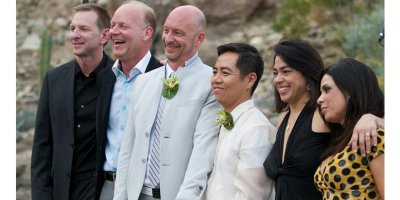
Christian: Currently, I serve as the Director of Collaboration Platforms for Merkle, which is a fancy way of saying that I am a geek who enjoys building solutions that help make people’s lives easier and facilitate interconnectedness amongst various groups of people (teams, projects, clients etc.). I’m originally from Baltimore City, but spent a large portion of my childhood in Towson, MD. Since then, I have bumped along the DMV until finally landing with my beautiful wife and growing family (just had identical twins in May) in Mt. Airy, MD. Our current home is a small farm in Mt. Airy where we spend a large portion of our time rescuing animals that were either slaughterhouse bound or in need of a second chance at life. To say I have Baltimore pride would be an absolute understatement; I have an entire sleeve dedicated to this city! While I appreciate the serenity and peace of Mt. Airy, I will always be enamored by my beautiful city by the bay. There is nothing that compares to the people of Baltimore, the pride they have in their history, their sports teams, local music, their local foods (especially crabs), and anyone local is unparalleled to any other city that I’ve ever experienced.

2. What is something you wish people knew about being part of the LGBTQ+ community?
Tom: The first thing I would like people to know is that you don’t come out once. You come out over and over again. Every time I meet a new client, every time I get a new boss, or co-workers. Every time I go on vacation with my husband and have to explain the sleeping arrangements, every time I get a new doctor, or dentist. The list goes on. It can be tiring after a while. Also, I would like people to know that the LGBTQ+ community is so diverse! When I first started making friends with other gays, I thought they would all be like me. Nope, they are as different as any other group of people! Which, in the long run, is because they are just like any other group of people.
Christian: There are more people who identify as part of the LGBTQ+ (I also lovingly use the term queer as a reclaimed word for our community) community than you may be aware. Oftentimes, people don’t speak out for fear of their safety, whether physical harm or other various actions/comments, that could cause problems with them seeking housing, employment, or having a stable/secure life. For some members of the community, the desire to want to “come out” to every person they encounter can be daunting as well as emotionally taxing. While many of the younger generation within the LGBTQ+ community have been able to be more visible and self-identify due to queer pioneers, there are still a lot of people who are afraid to show their authentic selves. While for some politics means selecting a candidate who aligns to your economic stance or foreign policy platforms, for others it means being able to endorse a candidate who will allow them to have basic human rights and access to a stable and secure life.
3. What has been the most difficult part of your LGBTQ+ experience?
Tom: I won’t answer this in a grander political way as I lived through the AIDS pandemic and I could write an entire book on that. I would say losing friends and family because they could not accept me. I can deal with losing a job because I’m gay (yep that happened to me and still happens to others), or being called queer or those types of things, because I can fight that; I can use my voice and my power to try to change that. But, losing someone you love because they can’t see through their own prejudice is the most painful.
Christian: Ignorance. There are a lot of assumptions that are made about people and their lives without ever actually having a conversation or asking the questions that could remove a lot of misunderstanding. I personally believe that a lot of preconceived notions or skewed societal norms that stem from a cis heteronormative culture have caused a lot of chaos when it comes to relating to people who don’t have the same background, whether socioeconomic, gender, sexuality, religion, political etc. Oftentimes, these engrained or learned assumptions can cause people to react in violent or hateful manners as opposed to seeking to understand where there might be an incorrect perception. When people are presented with information that is different than what they know to be true, there can often be a reaction that becomes more hostile. Jade Duggan, a mentor and a friend, taught me a wise concept: when presented with information that seems contrary to what you know, you should stay curious and explore how this new information could impact your life. The advice she always imparts is to be able to find the ability to be comfortable in the uncomfortable.
4. What has been the best part of your LGBTQ+ experience?
Tom: Just to be me. To be the person I am. To love my husband and to have gotten to marry him. To see the world through a different lens. There came a point when I was younger when I thought wouldn’t it be better if I just wasn’t gay? If I could just be ”normal”? Then you realize you are who you are, and it is beautiful and wonderful and who cares about normal since there is no such thing. I live a life that so many people couldn’t imagine because of who I am.
Christian: The LGBTQ+ community is one of the most vibrant and welcoming communities. Truthfully, it is a family which is a term most of us use to refer to others within our community. The community prides itself on allowing people to bring their authentic selves and embracing them for whomever they are and wherever they currently stand. A lot of us have been excluded at some point in our lives from friends/families/colleagues for who we are and the concept of creating a “chosen” family is one that we all hold close. I also know that my children will grow up with more understanding and appreciation for people from all walks of life.
My personal path has also afforded me the ability to understand more walks of life than the average person. I was socialized from birth in a different manner than how I live my current life, which, I think affords me the ability to be more compassionate to others' plights and challenges. A lot of us in the community laugh that we are “ninja’s” as we have been able to experience both sides of life and can take those lessons and apply them towards change in the future especially as it relates to inequities amongst genders and oppression based on gender.
5. What does “love is love” mean to you?
Tom: It is about loving someone completely, because of who they are. It is NOT about politics, or sex, or sexuality, or religion. It is that my love, your love, everyone’s love is equal, and special, and wonderful.
Christian: The ability to love with your whole self and express that love to another without fear of repercussion or harm; and to receive love in the same matter.
“The only queer[unusual] people are those who don't love anybody.” ― Rita Mae Brown
6. In what ways would you like to support the LGBTQ+ community (i.e being an ally)?
Tom: For allies – never let someone disparage LGBTQ+ people. If you hear something stand up and say something. Always. Support us even when we are not around, and someone makes a joke. Let them know you won’t stand for that, ever. And vote.
Christian: Being an open ear, an open door, and a visible presence in the community, in our organization and within the world. There is a lot that others can learn from your lived experience and being able to inform and educate can help to remove stigma and provide guidance to those in need.
To continue to push Merkle and DAN to implement policies, like pronouns in your signature, that can assist with making LGBTQ+ people feel more at home and to be able to bring their authentic selves to work.
7. To date, what has been your biggest learning or teaching moment as it relates to LGBTQ+ equality?
Tom: I think I realized in the early 80’s that the first step to teaching others about LGBTQ equality was to COME OUT. In the 80 and 90’s that was the single most important thing that our community did to change the hearts and minds of straight people. When you know someone personally and not just a “group” member it is harder to discriminate against them. Also, use your voice. Never let someone tell you that you are “less” of a person because of your sexuality. You are who you are. That is your truth.
Christian: For several years I lead a LGBTQ+ youth group called Rainbow Alliance where we taught middle school and high school children about queer history, provided a safe space for them to make friends, express concerns, and seek guidance when necessary. Along with helping the kids, this program also provided an outlet for parents to gain more understanding into their kids’ lives and to be able to seek advice from those who have lived similar experiences.
At my past employer, I had to fight to help LGBTQ+ (specifically trans*) people gain access to fair and equal healthcare coverage. This challenge meant seeking legal assistance and fighting against unfair healthcare riders and policies that limited the healthcare coverage that was afforded to LGBTQ+ people within the organization.
8. What inspires you about your workplace culture? (experiences that you have personally seen, inspiring stories, etc.)
Tom: I have experienced such acceptance at Merkle. I have never experienced any type of push back because of who I am. I’m allowed to join conversations where my colleagues are talking about their family and I can talk about my family and it’s all perfectly normal. Merkle trusts me to be a client partner – someone who basically deals with clients all day, by being myself. This is really important so I will stress this. Merkle and my bosses have always been comfortable letting me be very client facing and they have allowed my personal relationship with the client to include the fact that I am gay.
Christian: Merkle has always been a very open environment where the exchange of ideas and information is free-flowing. Our culture is blunt and transparent, which can be polarizing, but it does allow one to know where they stand. This is the only organization where I have worked that has put a vested interest in creating diversity, equity, and inclusion workgroups into place and are actually looking into metrics to verify that their programming is providing actual results.
Within my first month of working at Merkle, an employee was in the process of going through a medical transition and the care and concern that both HR and IT took to ensure that when this person came back into office, correct photos and names were available, along with a strategy for answering and alleviating questions, was remarkable. To my knowledge this was the first time that HR and IT had to fulfill a request like this. There were no offhand comments or jokes like I have heard in the past, just actual care for this person’s wellbeing and acclimation back to work.
8. Rapid fire:
Favorite food?
Tom: Pasta
Christian: Ethiopian
Favorite TV show/movie?
Tom: The Walking Dead/ Lord of the Rings
Christian: Hackers or High Fidelity
Favorite hobby/activity outside of work?
Tom: Walking my dog
Christian: Riding my Motorcycle and hanging with my family (furry, scaly, and human)
Favorite book?
Tom: Anything by Kurt Vonnegut, Jr.
Christian: Too many to pick just one: Ready Player One/ Catch22/Discipline & Punish
Best advice or mantra you try to live by (in your own words)?
Tom: Have courage to be who you are.
Christian: Referenced earlier: “Learn to be comfortable in the uncomfortable.”
"This world would be a whole lot better if we just made an effort to be less horrible to one another."--Ellen Page
“Never be bullied into silence. Never allow yourself to be made a victim. Accept no one's definition of your life; define yourself.” Harvey Fierstein


